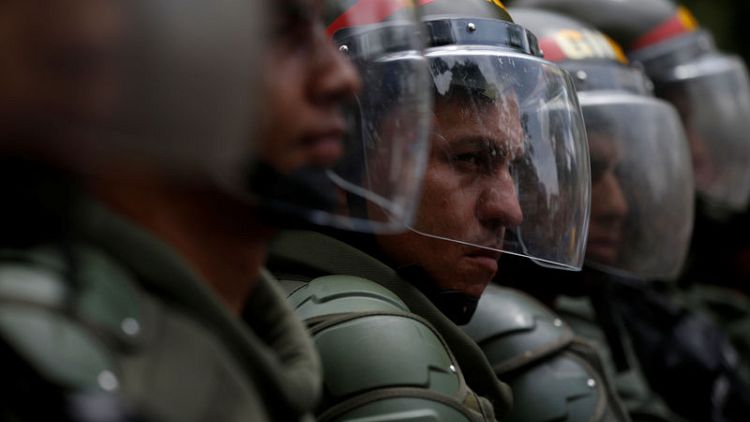By Brian Ellsworth and Mayela Armas
CARACAS (Reuters) - Buoyed by a telegenic new congressional chief, Venezuela's opposition is daring to hope that President Nicolas Maduro's days in office could be numbered, but the unpopular leader's bedrock base - the armed forces - shows few signs of erosion.
Opposition sympathizers, rallying around opposition leader Juan Guaido, are holding open air town-hall meetings that buzz with excitement about the legislature's recent challenges to the legitimacy of Maduro, who this month began a new term widely slammed as illegitimate.
Bolstered by the United States and numerous Latin American neighbours promising to back the opposition in seeking a transition, the Guaido-led congress last week declared Maduro a "usurper" and asked foreign governments to freeze bank accounts controlled by his government.
But with the legislature stripped of its powers by a pro-government Supreme Court and few signs that the military high command is prepared to abandon Maduro, the spring in the opposition's step and investor exuberance it has sparked may prove premature.
"The military leadership is faithful to Maduro and will continue to be until he's gone," said one active duty high-ranking military officer, who asked not to be identified.
An attack on a Caracas military output by two dozen low-ranking National Guard officers on Monday morning sparked opposition hopes of an uprising, but the incident was snuffed out quickly.
"A sergeant at a National Guard outpost is not to me important, what would be important is a situation like that in a major unit or a battalion," said Rocio San Miguel, a military expert with non-profit group Citizen Control.
Congress has declared Maduro illegitimate and promised a transition to a new government, bringing new energy to an opposition that has kept a low profile since protests in 2017 that left 125 people dead but failed to shake Maduro.
The excitement has spread from the streets of Caracas to the trading rooms of Wall Street, where investors have driven up the prices of the country's defaulted bonds on hopes for a new government that will be more likely to resume debt payments.
Guaido got another U.S. vote of confidence on Tuesday as Vice President Mike Pence issued a video message of support for those protesting against Maduro.
AMNESTY PROPOSAL
Soldiers have many reasons to be angry.
Military installations are steadily decaying along with the rest of the country, and salaries quickly disappear amid 2 million percent annual inflation.
More than 4,000 low-ranking officers deserted last year, according to official documents seen by Reuters.
Opposition legislators are developing an amnesty proposal meant to coax disgruntled military leaders into turning on Maduro, based on what they say are conversations with active officers who are eager for change.
Cliver Alcala, a retired army general who was close to late socialist leader Hugo Chavez but fell out with the ruling Socialist Party in 2016, said the disputed inauguration has damaged Maduro's image among troops.
"The barracks are not totally convinced that Maduro really is president," said Alcala in a telephone interview from Colombia.
But Maduro has worked hard to keep the military on side, well aware of its crucial role.
He has put officers in charge of key posts in the government and state oil company PDVSA [PDVSA.UL], while offering lucrative oilfield services contracts for military-linked firms.
And authorities have pursued military personnel suspected of plotting against the government, which human rights groups say has led to torture of suspected dissidents and abuse of family members.
The armed forces will also be sensitive to the lessons of the 20th century. Promises of a military "quick fix" to political instability in Latin American countries including Brazil and Chile gave rise to dictatorships that lasted for as long as 21 years and were later demonstrated to have abysmal records on human rights.
And so, the armed forces have remained silent as the economic collapse has left millions struggling to eat.
Military leaders are "not in the slightest bit concerned about maintaining their professional commitments," said the high-ranking military officer. "They're concerned about protecting themselves."
(Reporting by Brian Ellsworth and Mayela Armas, Editing by Christian Plumb and Rosalba O'Brien)
